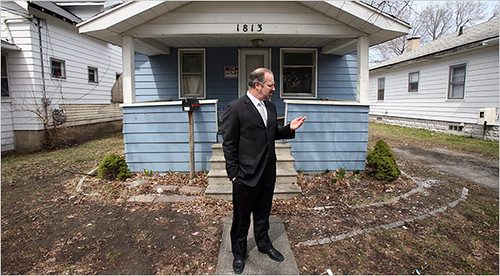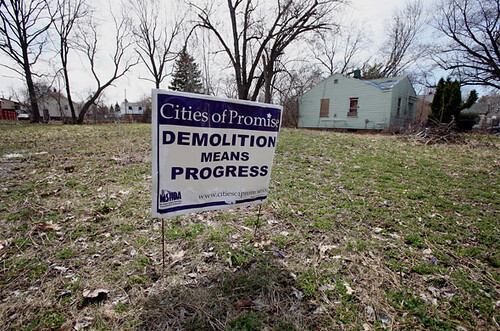An Effort to Save Flint Michigan by Shrinking It appears in today's New York Times. The article highlights the work of Dan Kildee and the Genesee County Land Bank - the go-to resource for best practices in managing urban decline.
Dozens of proposals have been floated over the years to slow this city’s endless decline. Now another idea is gaining support: speed it up. Instead of waiting for houses to become abandoned and then pulling them down, local leaders are talking about demolishing entire blocks and even whole neighborhoods.The population would be condensed into a few viable areas. So would stores and services. A city built to manufacture cars would be returned in large measure to the forest primeval.
“Decline in Flint is like gravity, a fact of life,” said Dan Kildee, the Genesee County treasurer and chief spokesman for the movement to shrink Flint. “We need to control it instead of letting it control us.”
The Buffalo News had a related series of articles last year about Buffalo's housing crisis. See Living on the Edge where I floated the idea that city services in certain sections of Broadway/Fillmore should be shut down.
See also - Our Urban Prairie, Summer 2008 and Getting Smarter about Decline.
See also - Our Urban Prairie, Summer 2008 and Getting Smarter about Decline.
Artspace • BAVPA • Woodlawn Row Houses • fixBuffalo flickr
Creative Class • Shrinking Cities • Saturdays in the neighborhood



5 comments:
Except that the unfortunate fact is that many of the people you would be condensing to to viable parts of the city are the vary same people who have made these destroyed neighborhoods un-viable in the first place. Concentrated poverty has proven to be unworkable.
Until this problem is understood to be a region wide problem there will be no success. Shutting down infrastructure in poor areas while continuing to build new sprawl infrastructure at the wealthy fringes accomplishes nothing
Anonymous, your prejudice is not consistent with the facts on the ground. The people who are left behind on the urban prairie are those who were responsible enough to buy and maintain their houses, thus keeping them occupied and out of the landfill.
(for the record)The first Anonymous was me.
Are you saying that everyone living in these slum neighborhoods are responsible home owners? Or is it more likely that most are owned by absentee landlords who rent to an impoverished population many if not most of who are deeply troubled by addiction, lack of education or the ability to work withing the general American social system.
Are you saying that people are not moving to get away form drugs violent crime gang-bangers and other massive social problems in the inner city?
I am not saying that there are no decent people in these neighborhoods. I am saying that the decent people are not the norm and that they are severely outnumbered. Shifting the problems of the slums into a higher concentration in another part of the city will not solve the problem
Vacancy is not the cause of the city's problems it is the result of the problem.
Certainly, investing heavily in neighborhoods that have no inherent conditions for revitalization is unwise, but I know of no desirable city in America that is pursuing planned shrinkage as a revitalization strategy. No city in history has ever shrunk to greatness; neither will ours, or that of Flint, or Gary, or Youngstown. Planned shrinkage is an admission of a city's failure, or unwillingness, to employ strategies to repurpose its economy, promote smart growth, and attract new talent. Despite the fascination of New York Times reporters with this subject, planned shrinkage and the purposed destruction of urban infrastructure has limited value and fails to address the problems and opportunities of Rust Belt cities.
This sounds too simplistic: "Vacancy is not the cause of the city's problems it is the result of the problem."Saying "result of the problem." implies there's only one problem. Really there are many simultaneous problems.
Also, it's not an either-or. Problems can be the result of other problem(s), while still themselves being real problems that should be dealt with.
On the other matter, planned shrinkage does make sense when shrinkage so obviously will be continuing no matter how much people may wish it won't.
Post a Comment